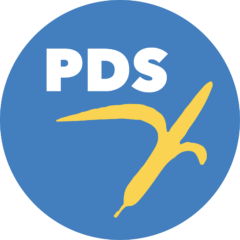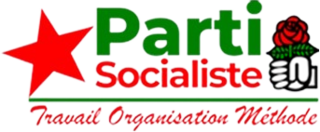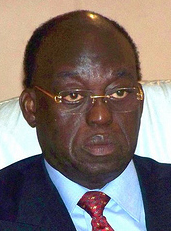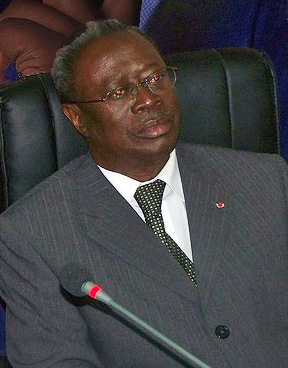
Abdoulaye Wade is a French then Senegalese politician who was President of Senegal from 2000 to 2012. He is also the Secretary-General of the Senegalese Democratic Party (PDS), having led the party since it was founded in 1974. A long-time opposition leader, he ran for President four times, beginning in 1978, before he was elected in 2000. He won re-election in 2007 with a majority in the first round, but in 2012 he was defeated in a controversial bid for a third term.

Idrissa Seck is a Senegalese politician who was Prime Minister of Senegal from November 2002 to July 2004. He was a leading member of the Senegalese Democratic Party (PDS) and was considered a protégé of President Abdoulaye Wade, but he subsequently went into opposition and was a candidate in the February 2007 presidential election, coming second place with about 15% of the vote.

The Senegalese Democratic Party is a political party in Senegal. The party considers itself a liberal party and is a member of the Liberal International. Abdoulaye Wade, who was President of Senegal from 2000 to 2012, is the party's leader. The PDS ruled together with smaller parties as part of the Sopi Coalition. Since Wade's defeat in the 2012 presidential election, the PDS has been the main opposition party.

The president of Senegal is the head of state and head of government of Senegal. In accordance with the constitutional reform of 2001 and since a referendum that took place on 20 March 2016, the president is elected for a 5-year term, with a limit of two consecutive terms. The following is a list of presidents of Senegal, since the country gained independence from France in 1960.

Macky Sall is a Senegalese politician who served as the 4th President of Senegal from 2012 to 2024. He previously served as the 8th Prime Minister of Senegal from July 2004 to June 2007, under President Abdoulaye Wade and President of the National Assembly from June 2007 to November 2008.

The Socialist Party of Senegal is a political party in Senegal. It was the ruling party in Senegal from independence in 1960 until 2000. In 2000, the party's candidate and previous incumbent president, Abdou Diof, was defeated by the leader of the Senegalese Democratic Party, Abdoulaye Wade.

Moustapha Niasse is a Senegalese politician and diplomat who served as the President of the National Assembly of Senegal from 2012 to 2022. He served in the government of Senegal as Foreign Minister from 1978 to 1984 and again from 1993 to 1998. He was Prime Minister of Senegal for a few weeks in 1983, and he held that position again from 2000 to 2001.

The Democratic League/Movement for the Labour Party is a political party in Senegal.

Presidential elections were held in Senegal on 25 February 2007. Incumbent president Abdoulaye Wade was re-elected in the first round with almost 56% of the vote.

Parliamentary elections were held in Senegal on 3 June 2007. They had originally been planned to be held together with the presidential election on 25 February 2007, but were postponed. Fourteen parties or coalitions participated in the elections, but they were marked by a major opposition boycott. The ruling Sopi Coalition won 131 seats, including all 90 of the seats elected by majority voting.

Robert Sagna is a Senegalese politician who served in the government of Senegal from 1978 to 2000 and was Mayor of Ziguinchor from 1984 to 2009. He was elected to the National Assembly of Senegal in 2007.

Abdoulaye Bathily is a Senegalese politician and diplomat. Bathily, the long-time Secretary-General of the Democratic League/Movement for the Labour Party (LD/MPT), served in the government of Senegal as Minister of the Environment from 1993 to 1998 and as Minister of Energy from 2000 to 2001. Later, he worked as a diplomat for the United Nations, and since 2014 he has been Special Representative of the United Nations Secretary-General for Central Africa.
Djibo Leyti Kâ was a Senegalese politician and the Secretary-General of the Union for Democratic Renewal (URD). He was a prominent minister under President Abdou Diouf from 1981 to 1995 and founded the URD in 1998 after splitting from Diouf's Socialist Party (PS). From 2004 to 2012, he again served in the government under President Abdoulaye Wade, initially as Minister of State for Maritime Economy and then as Minister of State for the Environment beginning in 2007. Man of the state, he then was appointed Minister under Macky Sall's government before becoming the Director of the CNDT.

Presidential elections were held in Senegal on 26 February 2012, amidst controversy over the constitutional validity of a third term for incumbent president Abdoulaye Wade. In the runoff on 25 March, Macky Sall defeated the incumbent president. The 2015 documentary film Incorruptible chronicles both campaigns as well as the youth movement Y'en a Marre, which led protests against Wade's administration.
The Alliance for the Republic–Yakaar is a political party in Senegal. It was formed by former Prime Minister and 4th president Macky Sall after his departure from the Senegalese Democratic Party (PDS) in December 2008. Macky Sall was also APR's candidate in the 2012 presidential election in which he defeated incumbent President Abdoulaye Wade. APR was joined by several former members of the PDS.

A constitutional referendum was held in Senegal on 20 March 2016. Proposed by President Macky Sall, it was the fourth constitutional referendum in Senegalese history. The proposed changes to the constitution were approved by 62% of voters. Voter turnout was 39%. A majority voted in favour in thirteen of the fourteen regions, with only Diourbel Region seeing a majority against.

Parliamentary elections were held in Senegal on 30 July 2017, having originally been planned for 2 July.
The Manko Taxawu Sénégal is a group of several political parties organised to contest the 2017 Senegalese legislative elections. The coalition was originally intended to form a unified opposition list to challenge President Macky Sall's Benno Bokk Yakaar coalition, but negotiations among key opposition figures broke down over disputes on whether former President Abdoulaye Wade or imprisoned former Mayor of Dakar, Khalifa Sall, would head the list. Wade instead led his own coalition, Mako Wattu Senegal, into the election.

Parliamentary elections were held in Senegal on 31 July 2022.

Presidential elections were held in Senegal on 24 March 2024. Incumbent president Macky Sall was ineligible to pursue a third term due to term limits in the Constitution of Senegal.













